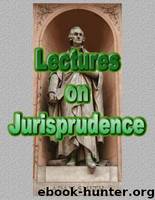Lectures on jurisprudence by Adam Smith

Author:Adam Smith [Smith, Adam]
Language: fra
Format: epub
Tags: Politics
Publisher: Evergreen Review, Inc.
Published: 2008-02-24T23:00:00+00:00
37 under the influence of the | king, a man of great integrity and knowledge who has been bred to the law, is often one of the first men in the kingdom, who is also tied down to the strict observance of the law; and the point of fact also determined by a jury of the peers of the person to be tried, who are chosen from your neighbourhood, according to the nature of the suit, all of whom to 13 you have the power of challenging.
The chief defect is that this jury must be unanimous in their opinion, unless they would choose to be greatly harrassed and at last treated with ignominy. And in this our Scots juries, tho they do not appear to be so well contrived in other points, appear to be superior as they are not required to be unanimous. It is very hard that they should thus be obliged to declare themselves of one opinion. The best men and of the greatest integrity may differ, and each think himself altogether certain that the matter is so; this must arise from the variety of human tempers and the different lights in 38 which men see things; and yet in this case they must agree or submit | to great indignities, as being first harrassed till they declare they will not agree, and in that case are turned out of the county. As this is the case, it must be that some of them takes a false oath, and as he must go over to the opinion of the other party. In criminall cases indeed there can be no great doubt as the favourable side is always to be taken, and this is generally looked on as a rule of quasi justice, and tho the party that desires to acquit the criminall be the fewest, yet the others, when they see that there are men of integrity who think him innocent, they will readily agree to think him so. But in civill causes there can be no favourable side; no one can tell which [which] side of the jury should yield. This must often happen, and yet one side must yield unless they incline to be disgrac'd. Nothing therefore can be more dissagreable than the office of a jury man in England. The better sort therefore always avoid it, and the jurys are generally composed there, and in Ireland where the case is the same, of freeholders who possess perhaps about 40 or 50 per annum, and are generally of no great reputation or 39 such as can enter into the minute | consideration of the evidence. So that the English, by adhering to the old custom of the unanimity of the 12 compurgatores, in which case it was very properly required, and endeavouring to give liberty to the subject, have overthrown their chief design. But altho this disagreable part had been removd, yet the multiplicity of juries is so great, as nothing can be decided without one, 150 years gone into desuetude, but at what time I cannot pretend to say.
Download
This site does not store any files on its server. We only index and link to content provided by other sites. Please contact the content providers to delete copyright contents if any and email us, we'll remove relevant links or contents immediately.
American Kingpin by Nick Bilton(3886)
Future Crimes by Marc Goodman(3598)
The Meaning of the Library by unknow(2571)
Inside the Middle East by Avi Melamed(2356)
Why Nations Fail: The Origins of Power, Prosperity, and Poverty by Daron Acemoglu & James Robinson(2297)
On Tyranny by Timothy Snyder(2231)
Living Silence in Burma by Christina Fink(2071)
Putin's Labyrinth(2022)
The Mastermind by Evan Ratliff(1937)
The Smartest Kids in the World by Amanda Ripley(1856)
Think Like a Rocket Scientist by Ozan Varol(1819)
Law: A Very Short Introduction by Raymond Wacks(1747)
It's Our Turn to Eat by Michela Wrong(1730)
The Rule of Law by Bingham Tom(1698)
Philosophy of law a very short introduction by Raymond Wacks(1670)
Leadership by Doris Kearns Goodwin(1638)
A Dirty War by Anna Politkovskaya(1630)
Information and Communications Security by Jianying Zhou & Xiapu Luo & Qingni Shen & Zhen Xu(1621)
Civil Procedure (Aspen Casebooks) by Stephen C. Yeazell(1556)
